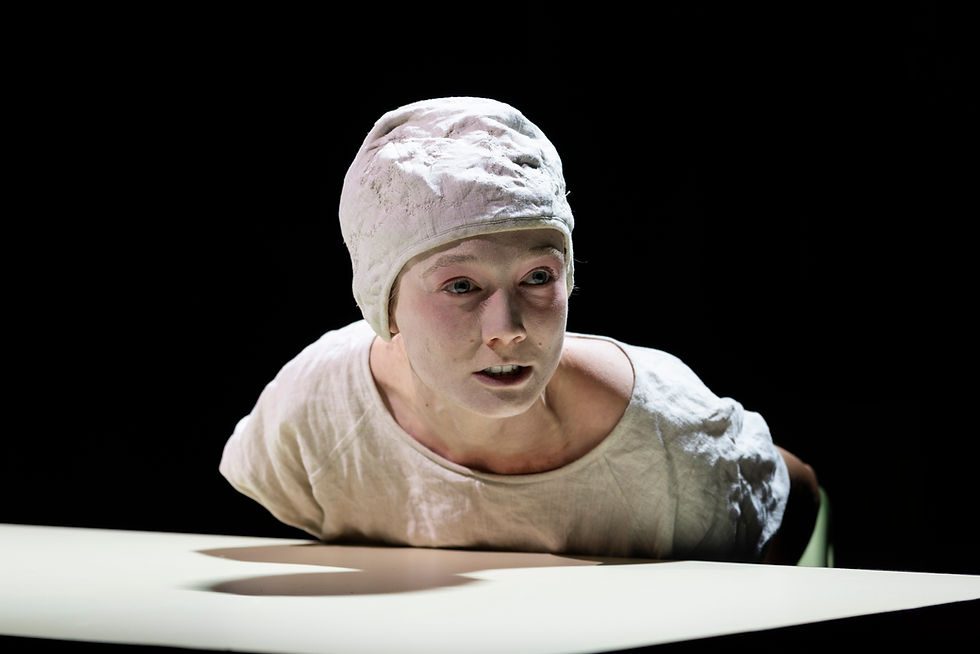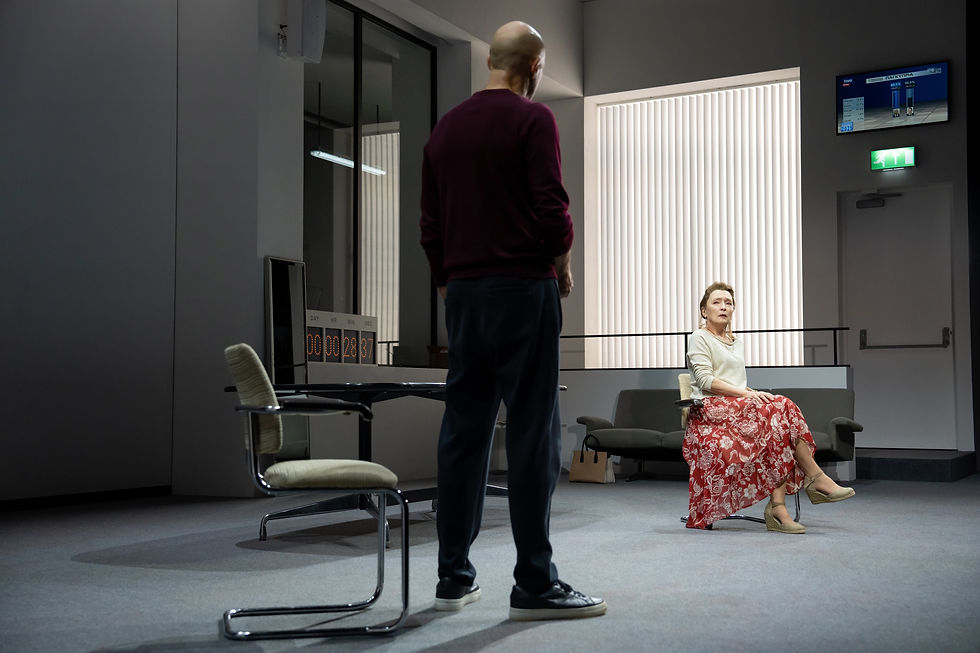Welcome to the Machine
- Jonathan Kalb
- Sep 28
- 4 min read

Among the most depressing facets of Donald Trump’s pathology is how all-consuming his hunger for attention is. You can try to tune him out, but the perpetual-outrage machine that keeps his image afloat makes his daily displays of ignorance, nonsense, lawlessness, self-dealing, and cruelty insistently omnipresent. That and the national ethical meltdown he has fomented are now so pervasive they’re like sticky weather. None of us feel we’ll ever be clean again until the wind changes.
Tim Blake Nelson’s new play And Then We Were No More, sleekly directed by Mark Wing-Davey at LaMama, seems intended as a bracing wind for our icky doldrums. It’s a full-throated jeremiad against moral collapse in the form of a dystopian parable about a fictional state that has exchanged personal freedoms and civil rights for security, also entrusting all its important civic decisions to an algorithm called “the function.”
I found it engrossing for about half of its two hours, largely because of uncommonly fine performances by the actors Elizabeth Marvel, Scott Shepherd, and Elizabeth Yeoman. By the end, though, Nelson’s parable began to feel too blunt and broad-brush for its own good. It’s like a Kafkaesque nightmare about AI whose fear factor isn’t novel enough to be shocking, or distinct enough from the daily news-grabs by Fat-Hand Don. Its dystopia is also rather quaint compared with all the recent movies about AI threats to humanity—Ex Machina, Her, The Creator.
Nelson is a gifted and serious artist. He began as a celebrated film actor in O Brother, Where Art Thou, became a writer and producer, and has kept a steady hand in live theater, with three previous plays produced in New York. I saw two of those—The Grey Zone (1996), a searing story about Auschwitz prisoners plotting an insurrection that he adapted into a powerful movie, and Socrates (2019), a wonderfully wry and intelligent portrait of the famous philosopher. Both plays were thoughtfully disturbing and vividly written. Nelson’s habit is to mine dark and deadly experiences for general human truths.
And Then We Were No More is no exception. It has the flavor of an early 20th-century Expressionist drama, with characters given titles instead of names—“A Lawyer,” “An Official”—and a set by David Meyer that makes machine parts vaguely menacing: antiseptic glass cubicles that move around, bright orange ducting hose snaking everywhere. The action opens on a tense interview between the Lawyer and the Official where we learn that the former hasn’t worked in a year and wants nothing to do with a justice system she’s lost respect for. The “function” has nevertheless chosen her to represent a condemned murderer.
This conversation turns out to be the play’s richest passage, because Shepherd and Marvel make it vividly specific, lending their characters’ lines much more granularity than they have on the page. Shepherd’s Official is a true-blue company man who tries hard to be kind but is innately captious. He digresses strangely on “nature,” and doesn’t concede a thing when the Lawyer points out his obvious inconsistencies. Is this man just dim? Passive-aggressive? Cagey? Those questions are only active and interesting because Shepherd finds ways to keep us uncertain, and because Marvel’s Lawyer is such a fascinating blend of vulnerability and poise. She comes off as a pillar of exasperation and integrity who can’t quite believe in heroism at all anymore, let alone her own.
This pair’s opposing reactions to the computer-driven totalitarian system is the play’s main conflict. The “function” has been deliberately designed to eradicate the unpredictably human, with dissent and disagreement no longer tolerated and chancy social processes like jury selection handed over to the fail-safe algorithm. Crime, as the Official boasts, has sunk nearly to zero due to the deterrent effect of a terrifying execution “machine” that vaporizes people, supposedly “without pain.” The Lawyer’s instinct is to preserve some scraps of messy humanity in this mechanistic hell, and the Official genially opposes her. Human nature, to him, has become unnecessary: “We are something altogether separate. No longer of nature. Human. We have left nature.”
Most of us have heard this debate many times before—machine versus man, modernity versus nature—and Nelson’s play, alas, does little to freshen it. The Lawyer is scolded for her outdated ideas of “freedom,” for trying to utter her client’s name at trial, for pointing out the absence of mercy in the sterile system. She contends not only with the Official but also with a rigidly technocratic Machinist (Henry Stram) and an Analyst (Jennifer Mogbock) who works for the corporation that makes the “machine”—both sketchily written figures and targets of easy scorn.
For all this predictability, though, Elizabeth Yeoman’s portrayal of The Inmate is another actorly high point in the evening. This woman, we’re told, killed her entire family and then tried to kill herself, because life came to seem worthless to her under the new regime. The authorities saved her only so they could kill her themselves, and have deemed her beyond rehabilitation. She initially agrees to execution, but after they torture her so mercilessly (in the name of research) that she is left aphasic, she changes her mind. She wants to live and hopes the Lawyer will help.

Yeoman plays this character as a hollow-eyed, disoriented, gentle-voiced gamine, a sort of light-struck deer who regains clarity and humanity before our eyes. Dressed in a dirty white smock and cap reminiscent of Lear’s Fool, she speaks haltingly in a fractured vernacular Nelson has stripped of many verbs and connecting words.
perfecting life said
humanity turned numbers
genes
who person are
decided like flavors
from menu
Yeoman delivers lines like these as if they make perfect sense, and that is crucial in making us lean in and attend closely. If you go see the play, watch how she avoids eye contact and then suddenly seizes it several times, using those fleeting flashes of connection as clarifying punctuation, self-soothing pauses. The heartbreaking moment when she touches Marvel’s hand briefly lifts this rather phlegmatic and self-serious play to a plane of much-needed grace.
By Tim Blake Nelson
Directed by Mark Wing-Davey
LaMama




Comments